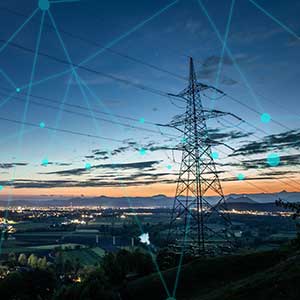Digital Solutions
Digital solutions for Power System
Our services
Digital technology is becoming essential for Transmission System Operators (TSOs). RTE international develops power transmission software solutions to meet their new needs and challenges, such as the integration of renewable energies or the increase in cross-border electricity exchanges.
Our team of IT developers, Power Network Modelling Experts, IT Project Managers, Optimization Specialists and Business Experts can cover all your needs, from the Business analysis to the deployment of the industrial solution. We support our customers from the design phase of the project to the deployment and maintenance of the applications and platforms that we develop.
RTE international uses the open-source framework developed by RTE’s software development department and relies on more than ten years of experience in TSOs’ and Regional Security Coordinators’ (RSCs) projects. In a nutshell, RTE international is providing its expertise in both the business end and the software development fields to all stakeholders of the Energy community.

Offering integration and development services on our open-source framework
- Supporting your team in the design phase, with a deep understanding of your business needs
- Proposing custom development to match your specific needs and integrate the open-source framework in your business processes
- Accompanying you in your projects, from the initial steps to the operational implementation

Proposing expertise and consultancy on IT-related missions
Around our open source framework
- On specific mission within your projects
- On all IT-related topics for power system companies

Supporting customers’ needs through tailor-made projects
- Accompanying you throughout your projects
- Implementing together innovative solutions
Our proposal of value
RTE international is providing its customer with a unique expertise in both the business end and in the fields of software development, enabling all stakeholders of the Energy community to effectively implement new software. The solutions that we develop for our customers are based on the following principles.
Open-source approach
Our services are based on an open-source initiative. The chosen open-source framework is mainly affiliated to the Linux Foundation Energy initiative, which guarantees, in addition to openness, neutrality with regards to the entities using this framework.
Modularity
Our framework is based on a modular approach using micro-services and Kubernetes, facilitating the customization of the software, as European coordination requires very specialized functionalities and processes. The deployment of new versions can therefore be done at the micro-service level. Each micro-service can be enhanced without impacting the other.
Interoperability
The proposed architecture, based on micro-services, enables the interoperability between components and the build of new features.
Scalability
The services related to the management of power networks require more and more computational resources, and results need to be performed in a limited amount of time. The proposed architecture allows perfect scalability (both horizontal and vertical) to distribute large computations efficiently.
High availability
The proposed architecture, deployed on Kubernetes, allows us to meet the high availability requirements of our customers and makes our solutions robust to incidents.
CGMES compliance
We have one of the most advanced tools regarding the CGMES roadmap and CGM building. The open-source framework is compliant with the latest CGMES requirements.
Security
Our services are delivered according to the highest standards of security for IT projects.
Our solution Market Modelling and Adequacy Studies
Antares-Simulator
Antares-Simulator is a probabilistic supply-demand balance simulator initiated in 2007. RTE international provides development, training sessions, support and evolutive maintenance on this open-source tool.
This tool is currently being used for the Ten Years Network Development Plan (TYNPD) of the European Association of Transmission System Operators (ENTSO-E), the ENTSO-E Short Term Adequacy Process and seasonal adequacy outlooks for many TSOs.
Our solutions Network Study Platform
RTE international proposes services around an open-source framework for network studies. Thanks to its long experience on the Convergence platform that is used for long term to close to real time activities in RTE, our solutions offer features to conduct all types of network studies. It includes many functionalities, including flow optimization calculation or studies of compliance with the N-1 criterion. This open-source project is developed under the umbrella of the Linux Foundation Energy.
PowSyBl
PowSyBl (Power System Blocks) is an open-source framework written in Java, dedicated to electrical grid modelling and simulation, licensed under the Mozilla Public License version 2.0. It is part of LF Energy, an open-source foundation focused on the power systems sector, hosted within The Linux Foundation.
The power system blocks can used through scripting for quick implementation (or prototyping), but also assembled to build state-of-the-art applications. Indeed, one major aim of the project is to make it easy to write complex software for power system simulation and analysis. For example, using PowSyBl, it is possible to applications with the ability to:
- Handle a variety of formats, such as CGMES for European data exchanges,
- Perform power flow simulations and security analyses on the network,
- Perform dynamic simulations on the network.
Another key characteristic of PowSyBl is its modular design, at the core of the open-source approach. It enables developers to extend or customize its features by providing their own plugins.
FARAO
FARAO is an open-source project aiming at providing an efficient solution for electrical power systems’ Coordinated Capacity Calculation, Local Security Analysis and Coordinated Security Analysis. These results of remedial actions optimization are providing the following advantages to the overall energy community:
- TSOs avoid the need to invest in new infrastructure,
- Improve market prices formation and contribute to price convergence in the long-term,
- Ease the integration of renewable energies
- Reduce the costs due to national tariffs.
By providing a modular and open-source tool, FARAO aims to:
- Increase the global social economical welfare,
- Reduce the redispatching/countertrading costs,
- Ease the monitoring by national and European regulatory authorities by offering a transparent implementation of the methodologies approved.
Unlike tools developed as a “black box”, any interested player can ensure its specifications are properly implemented; this also helps operators to make this tool their own. The application of FARAO is not limited to RSC’ Services, namely Coordinated Capacity Calculation and Coordinated Security Analysis. It could also be used by TSOs for local Security Analysis (for instance, local validation of the 70% margin required by the Clean Energy Package) or studies related to the bidding zone review.
Our solutions Cooperation and Coordination function
RTE international is proposing a wide range of services around OperatorFabric, the smart assistant for System Operators and its declination for TSO and RSC coordination, Let’s Coordinate.

OperatorFabric
OperatorFabric is a modular, extensible platform for use in electricity, water, and other utility operations. It provides a notification GUI that can be used for supervision or coordination processes. OperatorFabric is based on the concept of notifications called cards which contains data presenting events relevant for the operator.
Centralizing real-time business events in a single place to avoid having multiple screens/software
- Providing event notifications with filtering features (severity , date , process … )
- Providing event dispatching rules on a per user basis (based on groups, organizational entities, processes… )
- Providing event-sending endpoints for business applications
- Providing a mechanism of templating to customize events rendering (using HTML5 )
- Providing a view of the events on a timeline and agenda view
- Providing storage of all the events (archive feature)
- Providing notifications via sounds
- Providing possibilities to integrate screen form other applications
Facilitating interactions between operational control centers
- Sharing information in real time, as pre-formatted cards that can be sent either manually by operators or automatically by external solutions
- Introducing pre-formatted question/response exchanges between control centers. This can be used to implement operational processes (with the notion of “last time to respond”)
- Sharing events in calendar (also allowing repeating events)
Let’s Coordinate
Let’s Coordinate is a modular, extensible, industrial-strength and field-tested platform used to support RSC services between TSOs and their RSCs. It manages the workflows generated by the RSC’s tools in a single, harmonized screen, improving operational communication and coordination. This application is based on the OperatorFabric framework.







